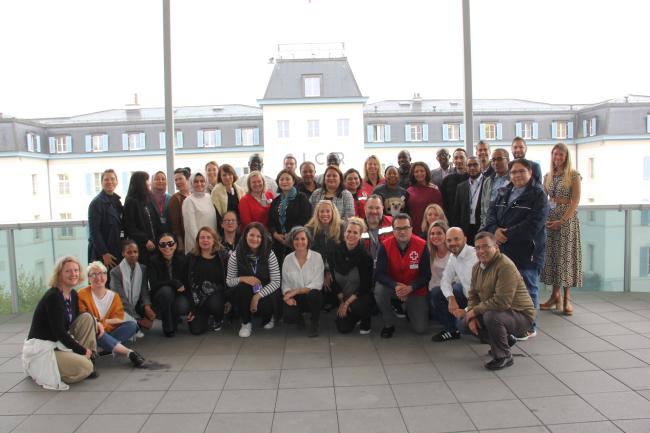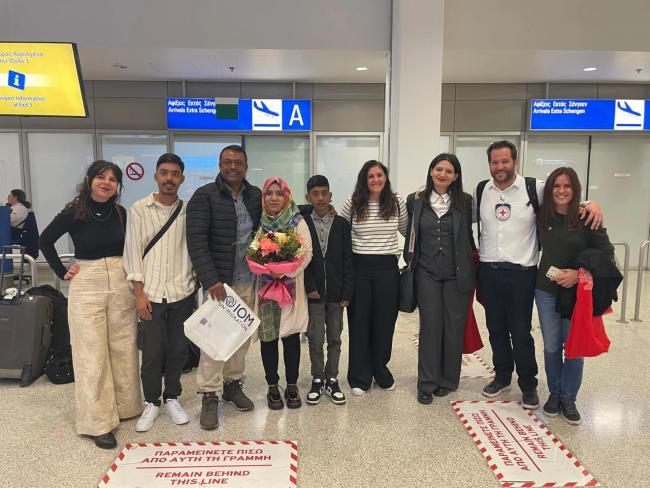Meetings on the Implementation of the "Restoring Family Links" Strategy 2022

Restoring Family Links (RFL) was one of the first services provided by the International Red Cross and Red Crescent Movement and it remains at the heart of the work of National Red Cross and Red Crescent Societies and the Central Tracing Agency of the International Committee of the Red Cross (ICRC).
Diana Araújo, an advisor in the ICRC’s Protection of Family Links Unit within the Central Tracing Agency, explains what the Family Links network is and what it accomplished in 2022.
What is the Family Links network?
The Family Links network comprises the Central Tracing Agency, the RFL units within the ICRC’s delegations and the RFL/tracing services of National Red Cross and Red Crescent Societies.
All the components of the Movement – the National Societies, the ICRC and the International Federation of Red Cross and Red Crescent Societies (the IFRC) – are responsible for a part of maintaining and strengthening the RFL network and its services, based on the Movement’s RFL Strategy.
Regional RFL platforms in many parts of the world provide a forum for cooperation, coordination, exchanges on practices, and development of regional RFL strategies.
What is the Central Tracing Agency’s role in the network?
The Central Tracing Agency coordinates its partners within the Movement, strengthens their capacity and provides advice in RFL matters in all situations requiring a humanitarian response from the Movement. It promotes consistency within the Family Links network, provides methodologies and guidelines, and builds information systems for the whole network.
The CTA supports with organizing and conducting training seminars and regional meetings for the purpose of sharing and consolidating knowledge and experience and planning and reflecting on progress in implementing the RFL Strategy.
Three years into the Movement’s second global RFL Strategy (2020–2025), what progress has been made implementing it?
To be able to fulfil the objectives of the RFL Strategy 2020–2025, we need to operate as a truly global and grassroots network. All components of the Movement are therefore responsible for implementing the strategy. Three global platforms have also been set up to provide essential support:
The RFL Leadership Platform: a forum for addressing critical issues and shaping the future of RFL services. It brings together leaders of the ICRC, the Central Tracing Agency, National Societies and the IFRC, representatives of families of missing people, people outside the Movement, and RFL experts.
The RFL Strategy Implementation Group: a group of RFL professionals from National Societies in every region, the ICRC and the IFRC who monitor, guide and support implementation of the RFL Strategy. Its members are part of Regional Implementation Teams.
The Application Group, which supports National Societies and the ICRC in systematically implementing the RFL Code of Conduct on Data Protection and promoting it inside and outside the Movement.
What did the RFL global and regional platforms achieve in 2022?
After two years of adjusting working methods to the COVID-19 pandemic, in the second half of 2022 current and former members of the global platforms were finally allowed to reconnect in person to move things forward.
The RFL Leadership Platform met face-to-face in Geneva on 1 and 2 December 2022 to assess progress on implementing the RFL Strategy, bearing in mind that it will soon be time to report on the progress to the next meeting of the Council of Delegates, planned for 2024. Participants also discussed the long-standing issue of how the Movement can better mobilize resources for the one and only service we deliver together and how we can amplify the Movement’s voice and strengthen our humanitarian diplomacy efforts externally on family separation and missing persons.
The RFL Implementation Group moved forward with one of its main objectives – collecting 2022 data on implementation of the RFL Strategy – using the monitoring & evaluation survey and RFL statistics. The Regional Implementation Teams held several regional workshops to raise awareness of the surveys and provide support and clarification. We now have the baseline data and a first year of comparison data, which will help us set priorities for implementing the RFL Strategy in the future.
The Application Group of the RFL Code of Conduct on Data Protection continued to develop support material for the Family Links network and the families of missing people, including guidance on deleting and retaining data and training materials for staff.
After more than three years working virtually due to COVID-19, most regional RFL meetings resumed meeting face-to-face:
- AmerCan (25–27 May, Cuernavaca,Mexico)
- AmerCar (27–29 July, Nassau, Bahamas)
- AmerSur (12–14 October, Quito, Ecuador)
- Africa (24–28 October, Nairobi, Kenya)
- Middle East and North Africa (21–23 November, Amman, Jordan)
- Eurasia (22–25 November, online)
Family Links Medal: Honouring those who bring families together
At the June 2022 meeting of the Council of Delegates, the Movement passed a resolution approving the creation of a Movement Family Links Medal and adopting its regulations.
The medal pays tribute to and recognizes individuals or groups of individuals (first and foremost staff and volunteers of the Movement) who have provided outstanding services in the field of restoring family links, whether in situations of armed conflict, other situations of violence, disasters or other situations requiring a humanitarian response, including in the context of migration. The medal is also intended to help promote, increase the visibility of and garner recognition for RFL services within the Movement and beyond.
The RFL Leadership Platform awards the medal to up to five recipients every two years on the occasion of the Council of Delegates. Unfortunately, the nomination process had to be paused to allow staff to respond to a data breach, which prevented the RFL Leadership Platform from selecting recipients for 2022. Those awards will therefore be conferred at the 2024 meeting.



